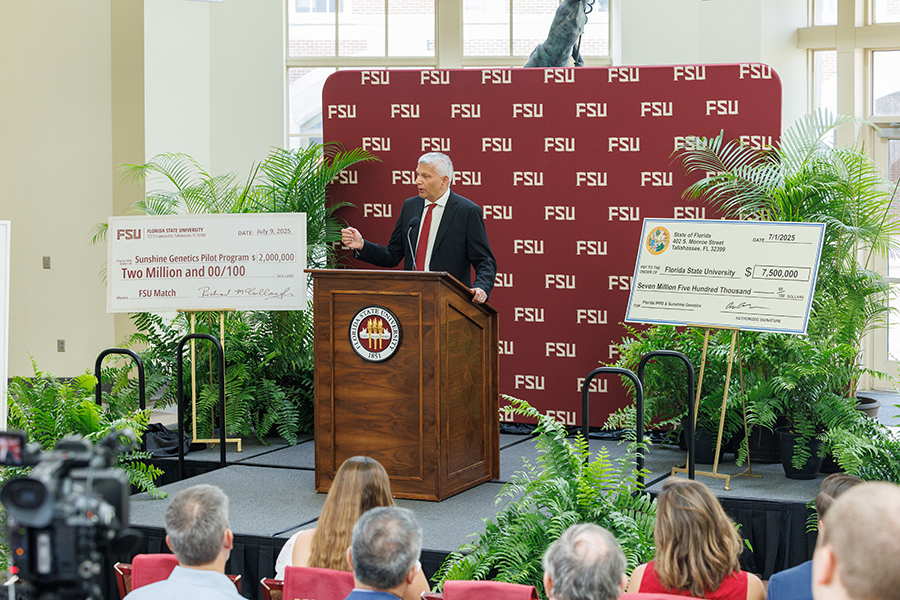
Florida is poised to become a national beacon for pediatric rare disease research as Gov. Ron DeSantis signs HB 907, the Sunshine Genetics Act. The act jumpstarts the Sunshine Genetics Pilot Program with $3 million, establishes the Florida Institute for Pediatric Rare Diseases within the Florida State University College of Medicine and lays the foundation for a new $100 billion genomic medicine industry in Florida.
In addition to the pilot program funding, the Florida Institute for Pediatric Rare Diseases at Florida State University will also receive an additional $4.5 million to boost research. The funding will empower the institute to pioneer groundbreaking treatments and end the previously lengthy search for a diagnosis by families battling the more than 7,000 rare diseases affecting 30 million Americans.
Demonstrating FSU's dedication to this initiative, President Richard McCullough committed $2 million from the university's budget to support the Sunshine Genetics Pilot Program.

The Sunshine Genetics Act, championed by Rep. Adam Anderson (R-Palm Harbor), establishes a five-year genetic sequencing pilot program for newborns and creates the Sunshine Genetics Consortium, uniting Florida's top researchers, clinicians and biotech innovators. Effective July 1, 2025, the law positions Florida at the forefront of genomic medicine, harnessing cutting-edge science to transform lives.
Under the pilot program, families can opt in to have their baby's full genetic code sequenced at no cost. The goal is to identify potentially serious but treatable conditions early, so that doctors can begin care before symptoms appear. Early care can lead to better health, fewer hospital visits and improved quality of life for patients.
"For too many families, a rare disease diagnosis is a journey of heartbreak and uncertainty," said Rep. Anderson, whose son Andrew died from Tay-Sachs disease. "The Sunshine Genetics Act is a promise to those families - a promise of hope, early detection and a future where no child's life is cut short by a rare disease. Florida is leading the way, and this historic investment will change lives for generations."
The Florida Institute for Pediatric Rare Diseases at Florida State University, launched in 2024 with Anderson's advocacy and prior state funding, will drive interdisciplinary research, leveraging gene therapy and precision medicine to improve outcomes for the 15 million U.S. children affected by rare diseases. A ceremonial check presentation took place on July 9, 2025, at the FSU College of Medicine, with Anderson joined by FSU President Richard McCullough, institute Director Pradeep Bhide, FSU College of Medicine Dean Alma Littles, M.D. and Dorothea Lantz, Director of Community Engagement for the Prader-Willi Syndrome Association and mother to a seven-year-old with Prader-Willi Syndrome.
Florida State University leadership thanked Gov. DeSantis, Rep. Anderson and the Florida Legislature for their support in developing the institute, which will have a positive impact on the lives of Floridians and children around the country.

FSU President Richard McCullough:
"Thanks to Representative Anderson's leadership and the strong support of Governor DeSantis and the Florida Legislature, the Sunshine Genetics Act is now law. Florida State University is proud to be part of this effort. We're building one of the most forward-thinking medical research environments in the country, and we're setting the pace by advancing research and supporting families across Florida. This is what we're all about."
FSU College of Medicine Dean Alma Littles, M.D.:
"We thank the Florida Legislature and Governor DeSantis for supporting this legislation establishing the Sunshine Genetics Act, allowing the Florida Institute for Pediatric Rare Diseases to continue its important work. The associated funding enables Florida State University and our College of Medicine to accelerate its pursuit of groundbreaking discoveries, leading to lifesaving treatments and improving the health of children with rare diseases. Embracing the collaborative opportunities with our Florida medical school colleagues, hospitals, industry partners and others, we are committed to advancing IPRD's work."
Florida Institute for Pediatric Rare Diseases Director Pradeep Bhide:
"Our mission at the Florida Institute for Pediatric Rare Diseases is to bring the latest scientific innovation directly to the patients and families who need it most. With support from the state, we will accelerate the development of advanced technologies for precision diagnostics and therapies for children affected by rare genetic diseases. The Sunshine Genetics Act enables us to do what matters most - deliver real solutions to families who have waited too long for answers. It is deeply rewarding to be part of that mission."
With this historic investment, Florida is not just advancing important and lifesaving science - it's building a legacy of hope, innovation and compassion for families across the nation.






